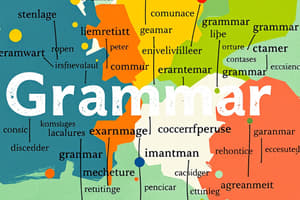Podcast
Questions and Answers
Which statement is true regarding the pronunciation of English?
Which statement is true regarding the pronunciation of English?
- English has more consonant sounds than vowel sounds.
- Received Pronunciation is representative of standard American English.
- English has 15 vowel sounds.
- English is notable for its use of stress and intonation. (correct)
What is the primary sentence structure of English?
What is the primary sentence structure of English?
- Verb-Object-Subject (VOS)
- Subject-Verb-Object (SVO) (correct)
- Object-Subject-Verb (OSV)
- Subject-Object-Verb (SOV)
Which of the following describes a part of speech in English?
Which of the following describes a part of speech in English?
- Pronouns replace nouns. (correct)
- Adjectives describe prepositions.
- Interjections are a type of preposition.
- Adverbs are a kind of verb.
Which of the following are major dialects of English?
Which of the following are major dialects of English?
What is one reason for English spelling inconsistency?
What is one reason for English spelling inconsistency?
Which of the following correctly identifies a tense in English?
Which of the following correctly identifies a tense in English?
Which English literature movement followed Romanticism?
Which English literature movement followed Romanticism?
Why is English considered the global lingua franca?
Why is English considered the global lingua franca?
Flashcards are hidden until you start studying
Study Notes
Overview of English
- English is a West Germanic language primarily spoken in the United Kingdom, the United States, Canada, Australia, and New Zealand.
- It is the third most spoken language in the world by native speakers and the most widely learned second language.
Phonetics and Phonology
- English has 12 vowel sounds and around 24 consonant sounds.
- The language is notable for its use of stress and intonation.
- Received Pronunciation (RP) represents standard British English pronunciation.
Grammar
- Parts of Speech: Nouns, verbs, adjectives, adverbs, pronouns, prepositions, conjunctions, and interjections.
- Sentence Structure: Generally follows a Subject-Verb-Object (SVO) order.
- Tenses: Present, past, and future, with simple, continuous, perfect, and perfect continuous forms.
- Articles: Definite (the) and indefinite (a, an) articles are used to indicate specificity.
Vocabulary
- English vocabulary is extensive, influenced by Anglo-Saxon, Latin, French, and other languages.
- It includes synonyms, antonyms, homonyms, and idiomatic expressions.
Writing System
- English uses the Latin alphabet consisting of 26 letters.
- Common writing styles include formal, informal, academic, and journalistic.
Dialects and Variations
- Major dialects include American English, British English, Australian English, and Indian English.
- Differences in pronunciation, vocabulary, and spelling exist across dialects.
Literature
- English literature has a rich history, from Beowulf and Chaucer to Shakespeare and modern authors.
- Literary movements include Romanticism, Modernism, and Postmodernism.
Common Misconceptions
- English spelling can be inconsistent due to its borrowing from various languages.
- The language has many exceptions to grammatical rules.
Language Development
- English is constantly evolving, with new words and phrases emerging regularly, influenced by technology and culture.
Usage and Importance
- English is the global lingua franca, essential for international business, travel, and diplomacy.
- Widely used in media, science, and technology.
Overview of English
- English is a West Germanic language with roots in the Anglo-Saxon, Latin and French languages.
- English is primarily spoken in the United Kingdom, the United States, Canada, Australia, and New Zealand.
- It is the third most spoken language in the world by native speakers and the most widely learned second language.
Phonetics and Phonology
- English has 12 vowel sounds and around 24 consonant sounds.
- English pronunciation is influenced by stress and intonation, which can change the meaning of a word.
- Received Pronunciation (RP) is the standard pronunciation for British English, often considered the most prestigious accent.
Grammar
- English has eight parts of speech: nouns, verbs, adjectives, adverbs, pronouns, prepositions, conjunctions, and interjections.
- Basic English sentence structure typically follows a Subject-Verb-Object (SVO) order, for example, "The dog chased the ball."
- English has a complex system of verb tenses that indicate the time of an action.
- Articles such as "the" and "a" are used to indicate specificity.
Vocabulary
- English vocabulary is large and diverse, incorporating words from various languages.
- Vocabulary includes synonyms (words with similar meaning), antonyms (words with opposite meanings), homonyms (words with similar spelling or pronunciation but different meaning), and idiomatic expressions (phrases with a figurative meaning).
Writing System
- English uses the Latin alphabet, consisting of 26 letters.
- English writing styles vary depending on the context and audience.
- Common writing styles include formal, informal, academic, and journalistic.
Dialects and Variations
- English has numerous dialects with regional variations in pronunciation, vocabulary, and spelling.
- Major dialects include American English, British English, Australian English, and Indian English.
Literature
- English literature has a rich history, spanning from ancient epics like Beowulf to contemporary works.
- Literary movements like Romanticism, Modernism, and Postmodernism have shaped English literature.
Common Misconceptions
- While the English writing system uses the Latin alphabet, spelling can be inconsistent, due to the language absorbing words from other languages.
- Despite efforts to standardize grammar, there are many exceptions to the rules within the English language.
Language Development
- English is constantly evolving with new words and phrases emerging regularly, influenced by technology, culture, and globalization.
Usage and Importance
- English is commonly referred to as the global lingua franca, used extensively in international business, travel, diplomacy, media, science, and technology.
Studying That Suits You
Use AI to generate personalized quizzes and flashcards to suit your learning preferences.




